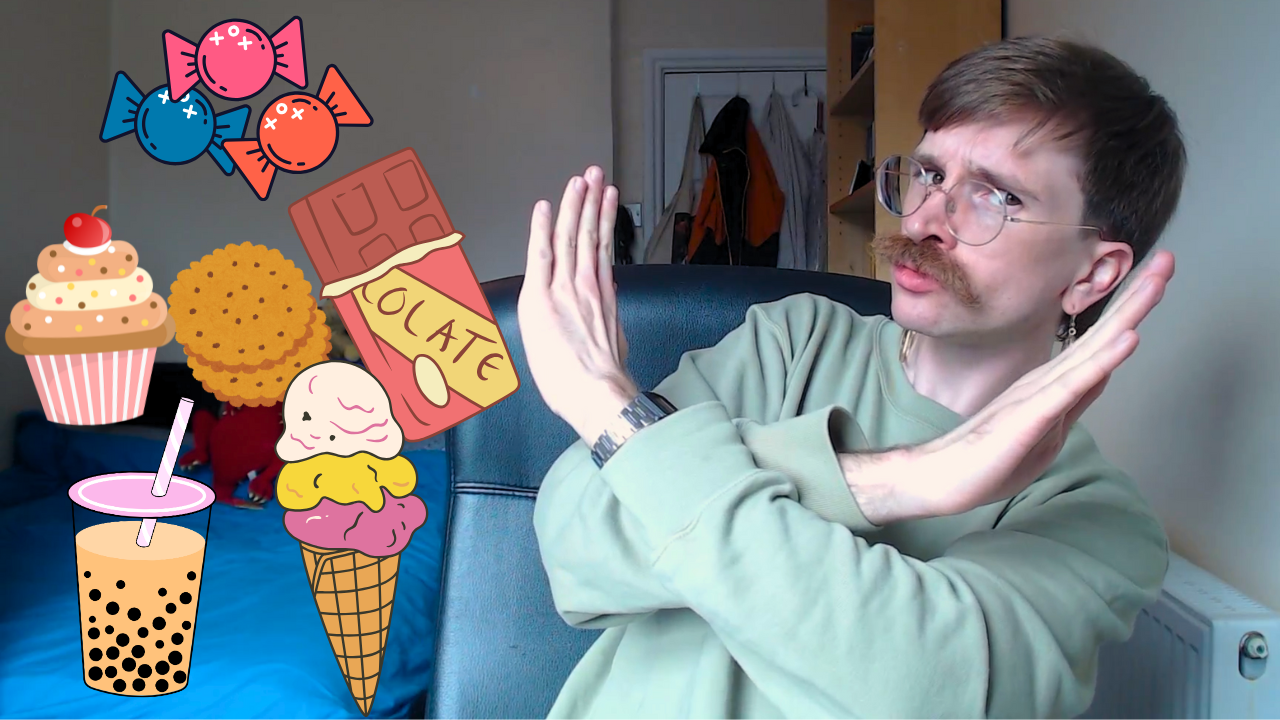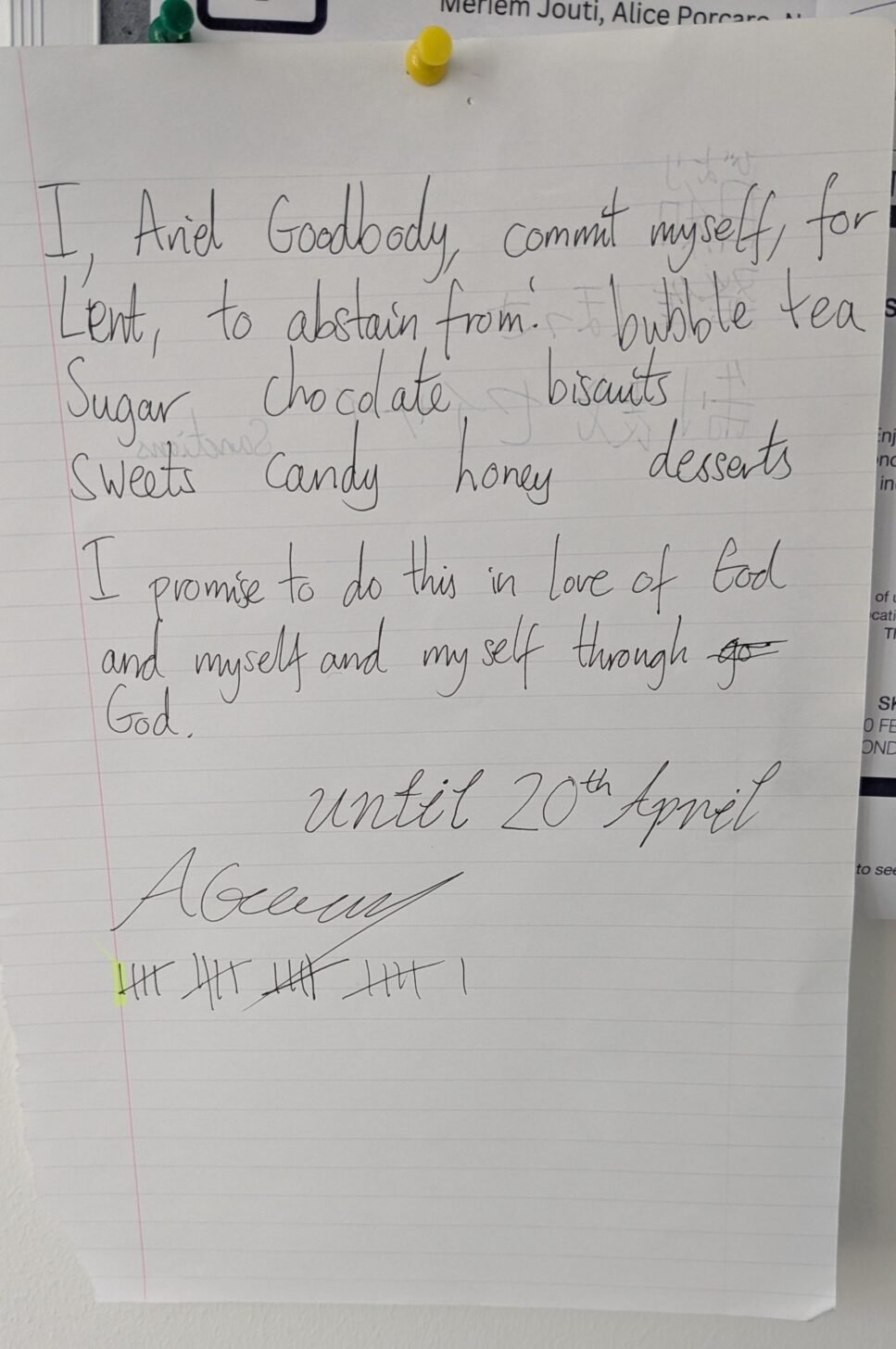
Welcome to Easy Stories in English, the podcast that will take your English from okay to good and from good to great. I am Ariel Goodbody, your host for this show, and today’s episode is a conversation about giving up sugar for Lent.

Now, you may have just heard a little noise. Do you hear that? Kind of a metallic noise? Well, if you’re listening and not watching the podcast on YouTube, I am wearing some very big earrings. I bought these earrings yesterday. They’re shaped like the peace sign. You know, the peace symbol that was popular in the 1960s. I think it was the sixties, not the seventies, and it’s kind of round and it has a line down the middle and then two diagonal lines going from the center to the outside. It’s a big circle with some lines through it.

Anyway, I’ve got these cool peace earrings, so I thought, where better to show them off than my podcast? Where better to debut them, to show them for the first time than my podcast? So here they are. So if you can’t see them, just imagine some big chunky hoop earrings, or go to the YouTube channel and watch there.
So what is Lent? Lent, L E N T, is the 40 days before Easter. Easter is probably the most popular Christian holiday in the year. People think it’s Christmas, but actually Easter is much more important because as Christians Easter is when we retell the story of how Christ was killed. He was crucified, killed on the cross, and then came back to life after three days.

Leading up to Easter, Jesus went into the desert. Jesus Christ went into the desert for 40 days and 40 nights, and while in the desert, he fasted. He did not eat or drink. He prayed and he was tempted by the devil. The devil. Satan appeared and offered Jesus food and power, but Jesus rejected the devil. He stayed strong in his faith, in his belief in God, and then he returned from the desert to face his death. And he died for all of us. He died for our sins.
Look, if you’re not a Christian, you’re probably not so interested in the religious part, but Easter is a really beautiful time of the year if you are a Christian, it’s a wonderful story. The services are very moving, and because of this history, because of this story of Jesus going into the desert and fasting, Lent, the 40 days before Easter, has traditionally been a time where all Christians choose to give things up, to fast.
It’s also Ramadan right now. Ramadan is a Muslim celebration, or I guess it’s a celebration at the end, but during the month of Ramadan, you fast every day from sunrise to sunset. So, um, I actually went to an Iftar the other day at my work. Iftars are when you break the fast, when you start eating after a day of fasting in Ramadan. So we had a work Iftar for some of the students, and I wasn’t fasting, but it was really nice to break bread with others and to learn about some Muslim traditions.
So anyway, traditionally during Lent, like really back in the old, old days of Christianity, Christians would fast as well, just like Muslims fast during Ramadan. Now that’s not so common. If you go back into the Middle Ages, maybe 500 years, people would abstain from certain things, they would avoid certain things. So people would abstain from meats, sex and alcohol typically.
But then over time, this became watered down. This became less of a common practice. Nowadays, at least in the UK, people choose to give something up, but many people don’t give something up, and when people do give something up, they’re not very serious about it a lot of the time.
I remember being at school and people would often say, oh, are you giving anything up for Lent? And people might give up things like chocolates or swearing or not doing your homework, right? And then adults might give up things like alcohol or cigarettes. But again, it’s not such a serious practice. And I dunno how common this is actually in other countries. My Italian friend, for example, had never heard of this. So giving things up for Lent may be quite like a specifically British thing. And obviously it’s only something that religious people tend to do.
And so this year for Lent, I decided to give up sugar. Now, what do I mean by sugar? I mean not eating sweets, pastries, chocolate, smoothies, bubble tea, cake, biscuits, all things of that sort. I am allowing myself fruit and jam and sauces, like ketchup, which technically have sugar in them, but in maybe quite a small quantity. Or you’re not like drinking ketchup from the bottle, I hope.
But I’m just trying to be careful about these other things. Like some fruits are really sugary, right? Like dates. So I’m not going to buy lots of dates because that will tempt me, right? That will make me want to eat more sugar.
So at the time I’m recording this, I’m about two and a half weeks into Lent, and it’s been going really well, actually. It was far easier than I expected. I’ve tried to give up sugar in the past, but I didn’t really do it in like a serious, structured way, and I’ve always been the kind of person who uses sweets to make me feel better when I’m having a bad day or when I’m bored. There was actually something I heard about during Covid. Lots of people started eating sweets and chocolate, and it was like our brains were understimulated. There was so little going on that we needed that like hit of sugar to kind of excite us, I guess.

So, um, this time has been much easier than any other time I’ve tried, but I’ve been pretty serious and intentional about it. I’ve told lots of people what I’m doing. I set clear rules for what I can and can’t eat. There’s an end goal, right? It’s tied to a re a religious practice, and I even wrote a little contract where I said something like, I, Ariel Goodbody promise to not eat these things until this date, and I signed it and I put it up on the wall of my classroom and I told all my students, this is what I’m doing. You have to hold me accountable.
So when you hold someone accountable, you make sure that they actually do the things they promise to do. So I ask my students to hold me accountable. If you see me eating sweets, tell me to stop. And that hasn’t happened, but, um, I think just telling other people, physically writing it down, committing makes it much easier.
So in the first few days of Lent, I was eating a lot of fruit. I like wanted that sugar, I wanted that taste of sweetness. So I ate a lot of tangerines and apples. But after the first week or so, I actually found I didn’t need that anymore and actually my desire for sweets, uh, it kind of went away. I think there’s wanting food emotionally and then wanting food physically, and the thing is sweets and desserts don’t offer much nutritional value to our bodies, so we really usually just want them on an emotional level.
And I’ve found that there’s certain activities or times that I just associate with sweet food, right? Like when I’m in a restaurant, I’m like, Ooh, I would like dessert because that’s something I’ve always got. I’ve always been the person who wants dessert even when everyone else doesn’t. Or there was a sunny day the other day and I was walking around and it was like, Ooh, it would be really nice to get like a smoothie or a bubble tea. And then I was like, okay, well, what’s something nice I can get that fills that need of having something in the nice weather, a nice drink, but isn’t sweet? So I ended up getting an iced hojicha latte.

So hojicha is a kind of Japanese tea. Uh, I think it’s some kind of grain like buckwheat or barley. I don’t know. But it’s a kind of tea, right? Like a kind of black tea, quite bitter. And I had that iced as a latte, so with milk, but no sugar. And it was really good. Uh, it was a very nice flavor. I got to enjoy the rich flavor, but it wasn’t sweet and I just fulfilled that need in a different way.
And that’s what I found is I’ve been thinking, well, first of all, my taste buds have been a lot more sensitive. So your taste buds are the little, uh, dots on your tongue, that pick up flavor. Yeah. We have taste buds for sweet food, for salty food, for sour food, for spicy food, and so on. Um, it, uh, especially in the first week or so, my taste buds were really sensitive. Like, I ate a tomato and I was like, oh my God, this is the most delicious tomato I’ve ever had. You know, I was really sensitive to flavors and everything just tasted more and better.
So I found if I’m craving sugar, I think okay. Oh, craving is when you really want something. Like suddenly you’re like, oh, I’m, I’m really craving a chocolate bar. For example, when women get pregnant, they often crave very specific foods. Maybe they crave food that they never liked before.
So what I do if I’m craving sugar, is I say, okay, is there something else I can get that’s not sweet, that still has an interesting flavor, which I can enjoy? And if it’s food, am I actually hungry? Because often I’m not really hungry. And if you’re eating something sugary, it kind of overrides that hunger, that fullness, I guess. Like you can eat sweet food when you’re full much more easily because the sugar kind of stimulates your body and it actually, I think it increases your appetite. It makes you hungrier. But if you’re really full and you’re like, oh, I wanna have, uh, chips because I really want that salty flavor it’s like, well, I can’t, I’m too full, right? So I just won’t eat. But yeah, often there is something I can have, whether it be, I don’t know, coffee, like a decaf coffee maybe in the afternoon, a nice decaf cappuccino.
‘Cause as there’s like a bit of sweetness in the milk, like maybe I wouldn’t have tasted that before. But now if I have a cappuccino with no sugar, it tastes sweet to me because I guess, yeah, the, the milk has got lactose or some kind of small amount of sugar in it.
In general, my appetite has been much less. Again, this is a change that I noticed the most at the beginning, and then it’s kind of evened out a bit. But generally, I can eat smaller meals and feel full and if I need to skip a meal, like if I need to not eat lunch or dinner because I’m going to a social event or something that used to be very stressful ’cause I would get really hungry, but now I can do that quite easily. Um, and I feel fine.
Uh, I think a lot of the pain of hunger, a lot of, a lot of the difficulty of hunger comes from sugar because sugar affects your blood sugar levels so much. It makes a dramatic spike in insulin, right? Which is this chemical to do with the regulation of sugar in the body. Whereas if you eat less sugar or no sugar, I can’t really say I’m eating no sugar because I’m still having bits of sugar in various things, but sure, I’m having a lot less sugar. When you have less sugar, um, your blood sugar is more stable, so you don’t get this like intense hunger, or at least that’s what I’ve experienced.
So originally the plan was to buy a really nice luxury Easter egg, like a chocolate egg to have on Easter Sunday, and I was even thinking of putting it up by my bed so I could look at it and fantasize and look forward to this delicious Easter egg.
But now I’m not sure because I’m really enjoying life with no sugar and I’m thinking I want to continue it. And I know myself and also generally, I just think this is how it works. I know that if I have some sugar, like if I. Like if after Lent I say, okay, I’ll allow myself to have a bit of chocolate at the end of the day, it will all go downhill. It will all change very quickly. I know that as soon as I open that door, I will start eating sugar and chocolate and sweets a lot, and I’ll just go back to how it was before. So I really do want to try and maintain this, um, if for nothing else, just because I like it.
And also I would be lying if I didn’t say I’m also a bit vain and uh uh. Vain is when you are obsessed with your appearance. You care a lot about your appearance. And to be honest, since quitting sugar, I’ve lost some weight and I know what you’re probably thinking. Ariel, you don’t need to lose weight. I know, I know I don’t need to lose weight, but it feels good to lose weight so easily actually.
And then also because I’ve been doing so much yoga and then I lost some weight, I can really like see the muscle definition on my body. Like I can really see all of the, the muscle. I’m showing some of it on the YouTube video right now. You might be, you might be able to see. Yeah, so muscles. I’m seeing them more. That’s nice. We like that and it just feels good for my body and I would like to do that for my body because I’ve struggled with sugar and sweets and chocolate for like all my life. So if I can just end it, then I think that will be amazing.
Um, the, the way to do these dramatic changes is to say, I’m not a person who does this, right? It’s to make it like a personality thing. Like I’m not a person who eats sugar, and for these 40 days, I feel like I am able to say that, right? Like, I’m not a person who does this. Oh, I’m not a biscuit person. I’m not a cake person. So I’m hoping that I’ll be able to continue that afterwards, even though it might be a bit annoying. Because I know I’m going to be in group situations and everyone else will want ice cream or we’re having dessert, and I’ll be like, sorry, I don’t do that. I don’t eat ice cream. I don’t eat dessert. But you know what? Sometimes you just have to be a bit annoying. Sometimes you just have to be different and special.
In other news, life is good. Spring has sprung. So spring is the season. Yeah. Springtime. Rabbits, flowers, leaves on the trees. And actually in English, spring is also a verb to spring, it means to jump. And the past is sprang and the past participle is sprung. So there’s this expression, we say spring has sprung, like spring has jumped, and that means that spring is here. Spring has begun.
And I love spring. Oh my God. Because every year in the UK, when it gets to winter and it’s really dark and the days are so short, I feel like all my energy is being sapped away. All my energy is just going, and then spring arrives and I’m like, woo, woo, woo. I’m like full of energy.
So yeah, spring has sprung. We’ve had some beautiful sunny days with like 18 degrees. I’ve spent time in the park catching the sun. I can wake up and it’s light outside, although next week is daylight savings. So we’ll go back to darkness in the morning for a few weeks, but what that does mean.
Daylight savings is, you know, when the clock moves backwards or forwards. Not all countries do daylight savings. It’s a bit of a stupid system, to be honest. But the advantage of daylight savings next week is that the days will be longer. Well, they’ll feel longer. They’ll feel darker in the morning, but then the sun goes down at like 7:00 PM and it’s fabulous. I love long British evenings.
That is one advantage of the weather here. Okay. So it’s like cold and wet and stuff. But in summer we get such long days, like in the summer here, the sun sets at like 10:00 PM. It’s gorgeous. You can sit out in the evening in a park. Oh, it’s so nice. I’m really looking forward to that.
I remember during Covid in that summer, I used to walk up to the park near my house at like 8:00 or 9:00 PM and everyone was sitting out on the grass, you know, socially distanced, of course. And I would just lie down on my blanket, read a book, watch the sunset, have a nap. Well not really have a nap, just kind of lie down. And then when it was time for bed, I would walk home and go to bed. It was, it was really, really nice. So I’m looking forward to doing things like that again.
I have been very busy. I’ve been doing a lot of yoga. I’ve been doing some work related stuff. Obviously I’ve been making the podcast. I’ve been socializing a lot. Um. And I’ve been preparing for my Japanese exam, which I think is going well. The last practice test I did, I got like 80% overall and in all of the sections but one, I got like 85 or 90%. There’s just one section, which is the vocabulary. I think it’s just the vocabulary section that I got, like 55%. Um, but overall I would almost certainly pass.
So to be honest, the main way to improve the vocabulary is just to keep reading books and making flashcards with new words from the books. What I now actually, okay, this is interesting, right? Um, normally I’m anti flashcards. So flashcards is when you make these little cards where you write a word on one side and then the definition on the other, and you use them to study with, right, to test your memory.
And, um, it’s a very like old school traditional language learning method to make vocabulary flashcards. And nowadays, most people make digital flashcards, and if you make digital flashcards, they use often a spaced repetition system, SRS, which uses research on intervals, like what are the best intervals for studying words to remember them the best. It can also be with like facts or other things for any kind of studying, but for languages, it’s usually words, right?
And I’ve traditionally been very anti flashcards, like I think it’s much better to focus on comprehensible input, so reading and listening a lot in your target language. But because for this exam I need to know as much as possible. Some of the vocabulary is pretty obscure. It’s not very common vocabulary, and I need to remember all the pronunciations, which is difficult with Japanese ’cause the characters can have really different pronunciations depending on what word they’re in. I’ve started making flashcards, but I found a way of doing it that I think is much more effective.
I didn’t invent this, but it’s called sentence flashcards, right? And it is a really obvious concept. Now that I know it, I kind of wish I had figured it out before. But essentially I read my book and then when I come across a word that’s new, I highlight the sentence and then later on I make a flashcard from that sentence. So on the flashcard, on one side, I have the whole sentence, and then underlined is the new word, the word that I learned, uh, or that I came across for the first time. And then on the other side is the definition and pronunciation of that word.
So the idea is rather than just learning words without context, you learn them in a specific context and you learn what they mean specifically in that context. And because the flashcard is from my reading, I can remember, oh, this was talking about this thing happening. This was in that chapter, and I have like an emotional link to it. So it’s far more effective for learning words. It’s also just more intentional, like it takes more time to make the flashcards, but then just that fact by itself means I’ll probably remember the words better.
So yeah. So I am making flashcards and studying flashcards as well. And that’s basically all I can do to improve the vocabulary section of the exam. Um, I’m gonna do more practice questions, but I’m pretty confident that if I keep studying, I’ll be fine. Hmm.
Okay, so thank you for listening to this episode of Easy Stories in English. If you are interested in taking classes with me, I’ve talked about this before, you can book private one-to-one online classes with me.
I do want to remind you that you can book a free 15 minute online consultation. Just go to EasyStoriesInEnglish.com/Classes. You can put a time in your calendar to meet me on Zoom or Google Meet. Please do show up at that precise time because if I don’t see you there for the first five minutes, I’ll probably disappear. I have other things to be doing. So you know, it is a specific time slot, but it’s a great chance to ask me any questions, get an idea of how classes would work, and just maybe to get rid of that anxiety that comes of booking classes and things online. I know what it’s like. When I book language classes online. I get pretty nervous as well. So anyway, thank you for listening and see you soon.
Leave a Reply